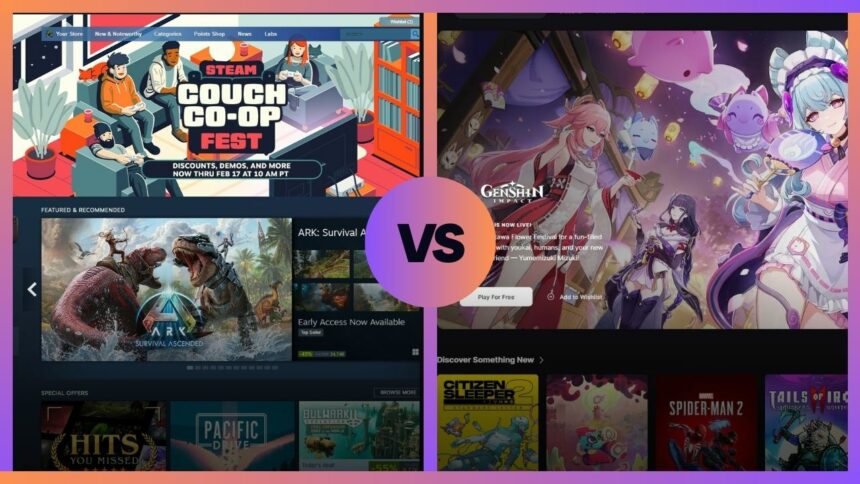If there’s any debate in the gaming community when it comes to marketplaces and game launchers, Steam and Epic Games Store would arguably be the hottest topic. If you’re a new PC gamer coming from gaming consoles or simply someone who’s looking at choosing one of the two marketplaces, this article should cover most of your questions.
The other day I was talking with a friend who I hadn’t seen in a long time. He has been a gamer for most of his life, but unlike most of us, he started with PlayStation 1 and stayed with Sony’s gaming console until 2025. He never used a PC to play games, apart from a few times that he joined us in Internet cafes, and he never switched to Xbox either.
We talked for a couple of hours, and two of his questions stuck with me: Where do people get their games for PCs, and how do they import third-party modes on them?
You see, unlike what many people would think of a guy simply switching from a PlayStation 5 to a gaming PC in 2025, I would never have believed that the actual reason for doing so was all about playing with modes. Then again, modes are extremely fun, and they can give you an experience that you’ll never get otherwise, just because the developers haven’t included in their plans any new changes or improvements.
Look at GTA’s PRs, for example, which are so fun to play that thousands of people have already joined them. There’s been a crazy decade on YouTube with gamers playing third-party modes created by the community, showing how fun it can be to join an unofficial release of a mode that you’ve never seen again.
Although joining on third-party modes is fairly easy, and the process is usually different depending on each game, the biggest question remained: Where do PC gamers buy, download, and play their favorite games from? Is it Steam, or is it the Epic Games Store? And if it’s one of them, why?
Which gaming marketplace has the most games?
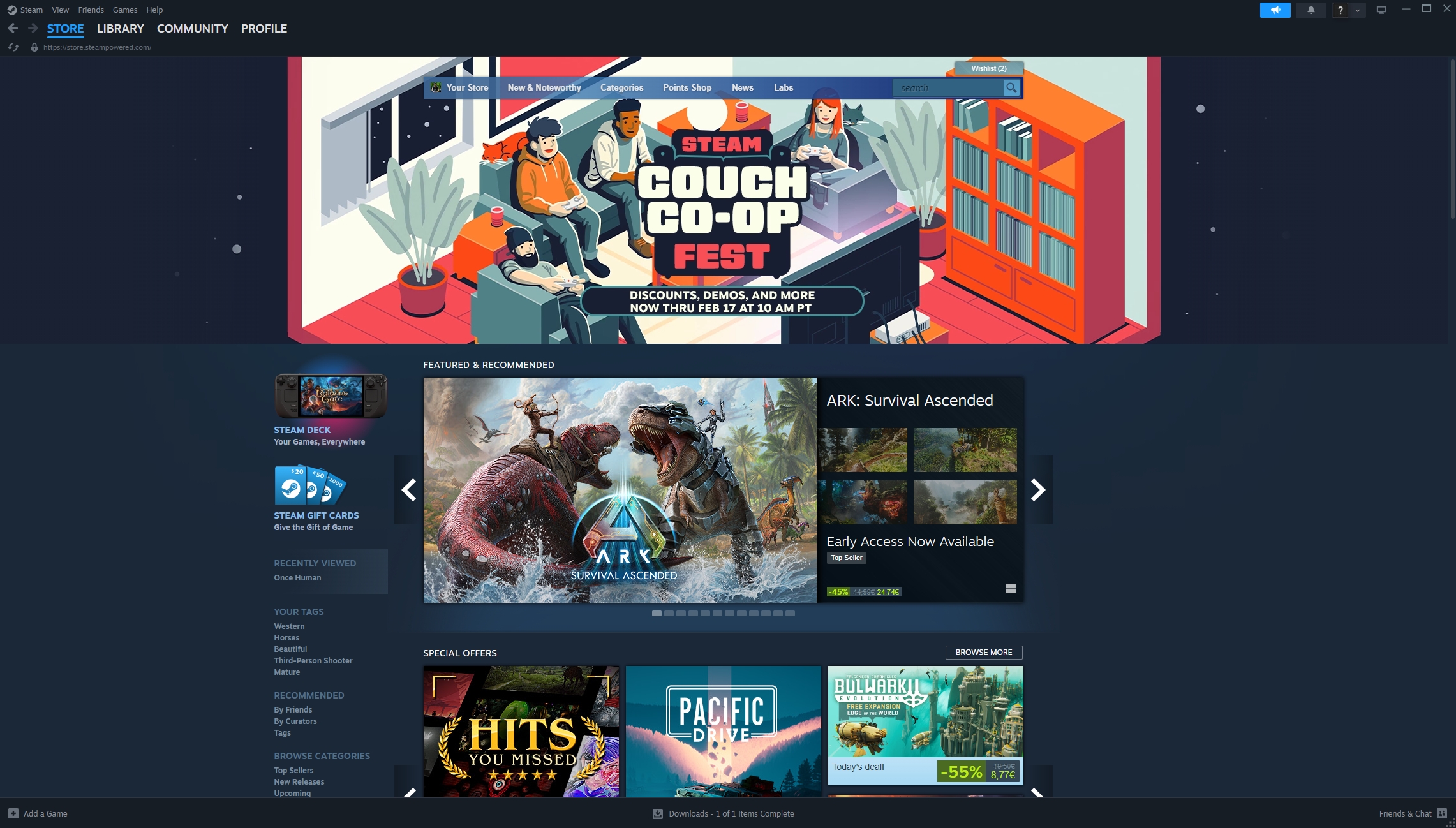
Although the number of available games shouldn’t play the most important role when choosing between the two marketplaces, it’s still crucial. You may find yourself looking for titles that are simply not available on both marketplaces, with each one providing its own exclusives.
When it comes to statistics, based on the latest Statista reports, Steam has over 132 million monthly active users, of which 69 million use the marketplace daily. When it comes to its vast catalog, Steam offers more than 101,035 games for US citizens, while the number may differ depending on each individual’s location.
The Epic Games Store, on the other hand, has a substantially lower number than Steam, with the marketplace offering just over 2,900 titles as of this moment of writing. Based on its 2023 Year in Review report, the marketplace has over 270 million PC registered users, from which over 36.3 million are actively using the marketplace on a daily basis.
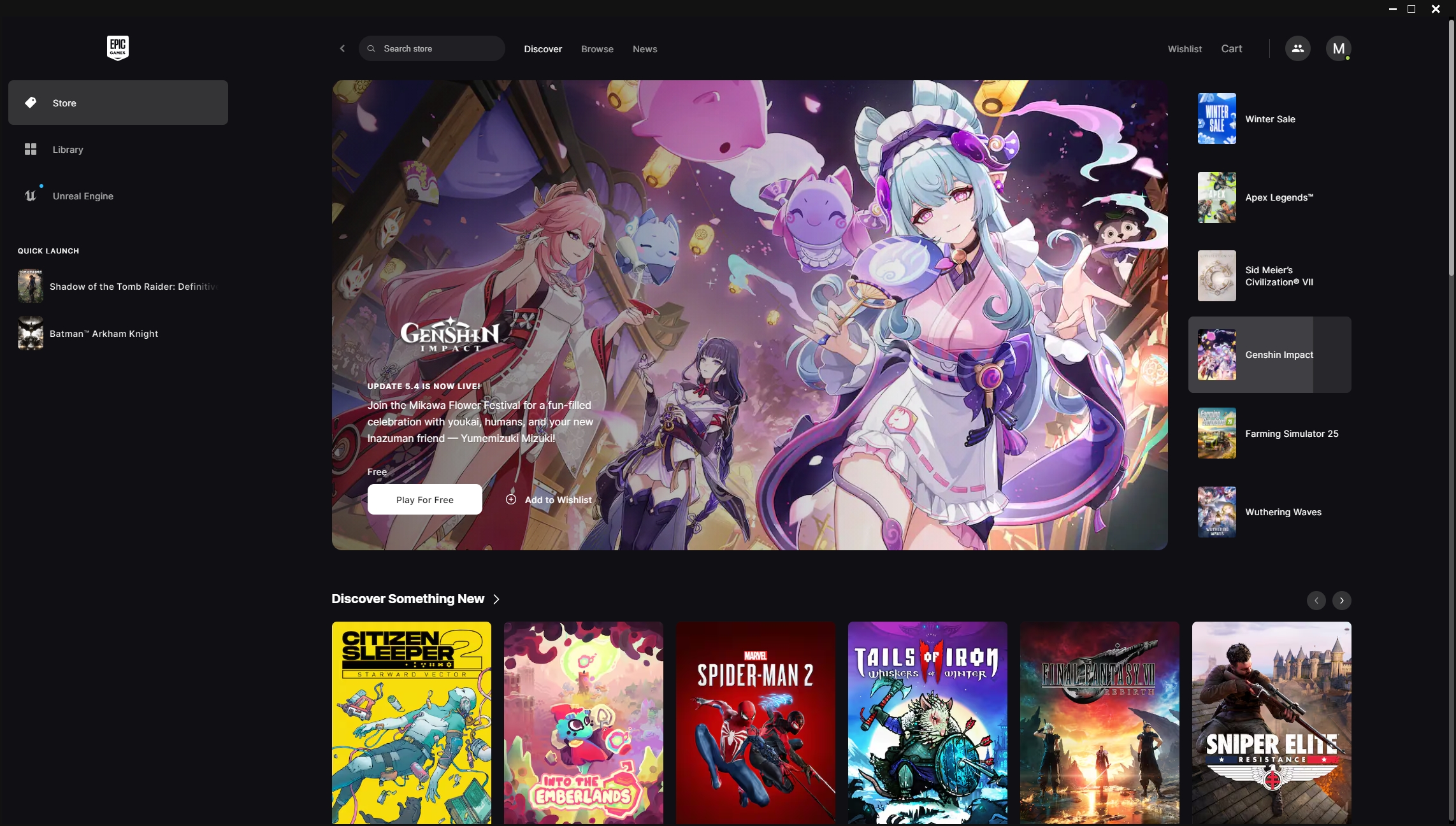
But the exclusives that each marketplace has is what makes them greater. For example, Steam currently offers games such as Half-Life: Alyx, Counter-Strike: Global Offensive, Dota 2, Team Fortress 2, and Portal 2, just to name a few, which are only available on its platform.
Epic Games, on the other hand, includes Alan Wake 2, Hades, Rocket League, Satisfactory, and The Wolf Among Us 2 as some of its exclusive titles.
Discounted offers and free games
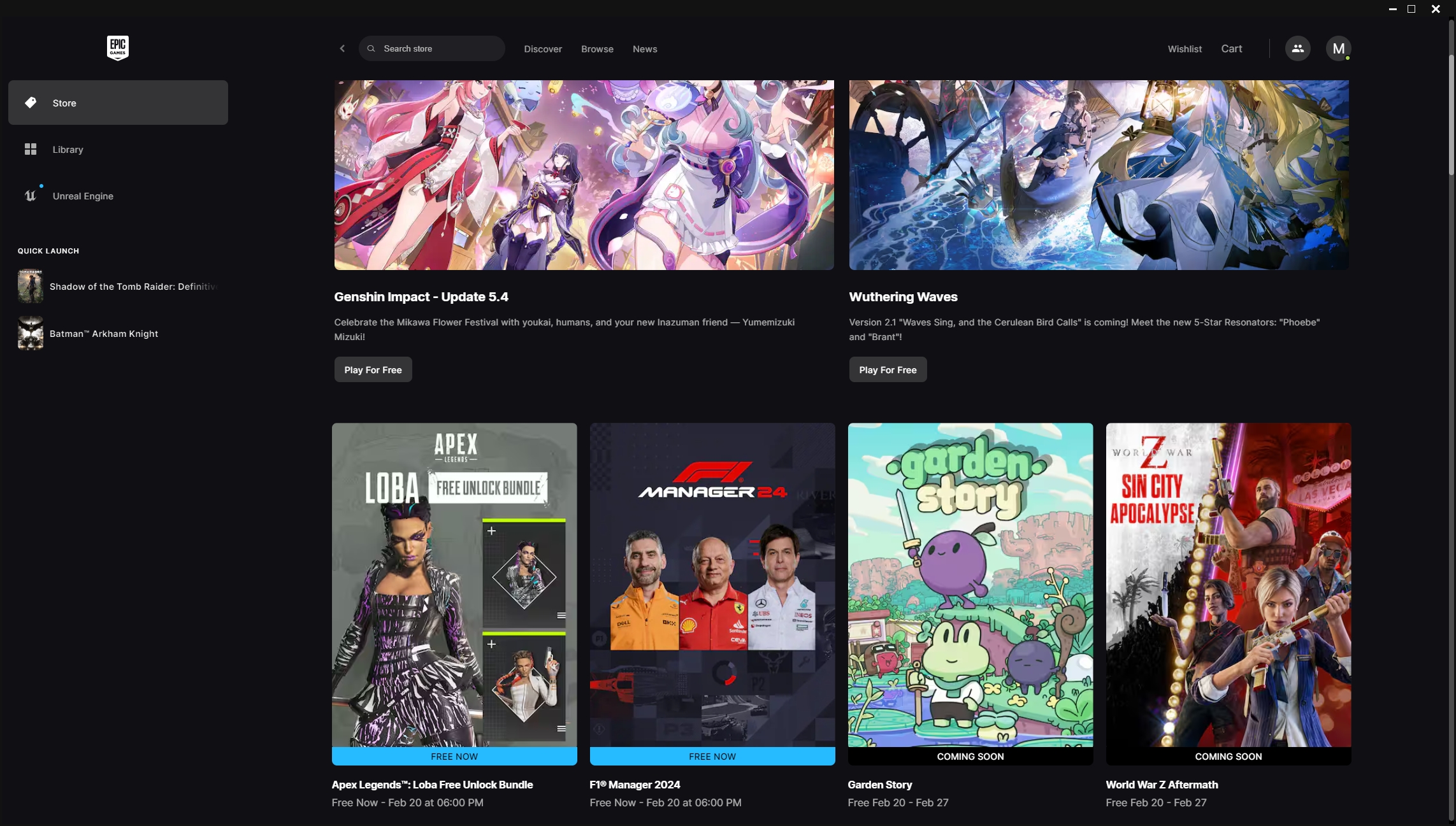
When it comes to finding and playing free games, Steam is, hands down, the best overall option here. Thanks to its vast library of games, you can find almost anything on its platform, from the newest AAA free-to-play titles to the least-known indie games that fewer people know.
But there’s another side of the game that Steam simply can’t beat Epic Games, and that’s their weekly free games. For many years now, players have waited each week to see what are the two new games that the marketplace will offer for free, many even going as far as trying to speculate the platform’s next moves.
It has become something of a culture itself, as bloggers and journalists alike are also trying to find any leaks or rumors about the upcoming Epic Games’ free offerings. You never know what the platform will offer, and as we’ve seen in the last few years, sometimes their offerings are far from magical – just remember when they added GTA 5 as their free offering for a whole week.

I was able to grab some of my favorite games completely for free, thanks to their offers, including GTA 5, The Elder Scrolls Online, Shadow of the Tomb Raider, Watch Dogs, Metro 2033 Redux, and even the Batman: Arkham series (excluding the Batman: Arkham Origins).
With that in mind, Steam may be offering thousands of free games, but it surely doesn’t offer the same suspense players feel each week with Epic Games’s crazy offerings.
Supporting the game developers
Let’s talk about developers, shall we? I mean, it’s not always big and profitable companies that develop and design games; there are thousands of indie titles out there from individuals and smaller companies that they really care for each sale.
The money not only goes to the developers themselves but also for funding the next updates, DLCs, and newer releases. But like with any other third-party platform in today’s age, both Steam and Epic Games keep a fee each time someone purchases a game through them.
When it comes to revenue split, Epic Games Store is the clear winner, giving 88% of each sale to the game developers. Steam, on the other hand, gives back 70% of the revenue, meaning they keep a whole 30% of each sale.
But there’s a catch: Unlike Epic Games, Steam has a neat feature called “Steam Keys“. These are single-use, unique, alphanumeric codes that customers can activate on Steam to add a product license to their account. Developers can use those keys to provide the game for free for beta testers or the press, influencers, bloggers, and content creators alike, or sell it through third-party stores without Steam keeping a fee.
Of course, Steam has its own basic guidelines and rules around these keys and how developers can request or sell them, but it’s still a nice addition.
Features, availability, and UI

When it comes to downloading, installing, and using any of these two game launchers on any device or operating system, this is where you start to understand which one performs better. The true power of a gamer comes when a game launcher is fast, stable, and provides an error-free experience, and both launchers have their own pros and cons when it comes to gaming.
Starting with Steam, it has a very cluttered and difficult-to-use interface that’s not for many. It has tons of options, many features, and additional tools that gamers can use to improve their gaming experience, but at the cost of using a bloated application. In a mission to help gamers discover as many games as possible, everything has become smaller, with fonts being in such a small size that it hurts my eyes each time I try to read a game’s description.
Steam also feels slow and laggy, and if you’re running it on older hardware, you may experience even more issues. The community activity pages feel outdated, the News Hub feels inconsistent, and many times you feel that the UI is so different in some sections or pages that it feels like you’re using another game launcher.
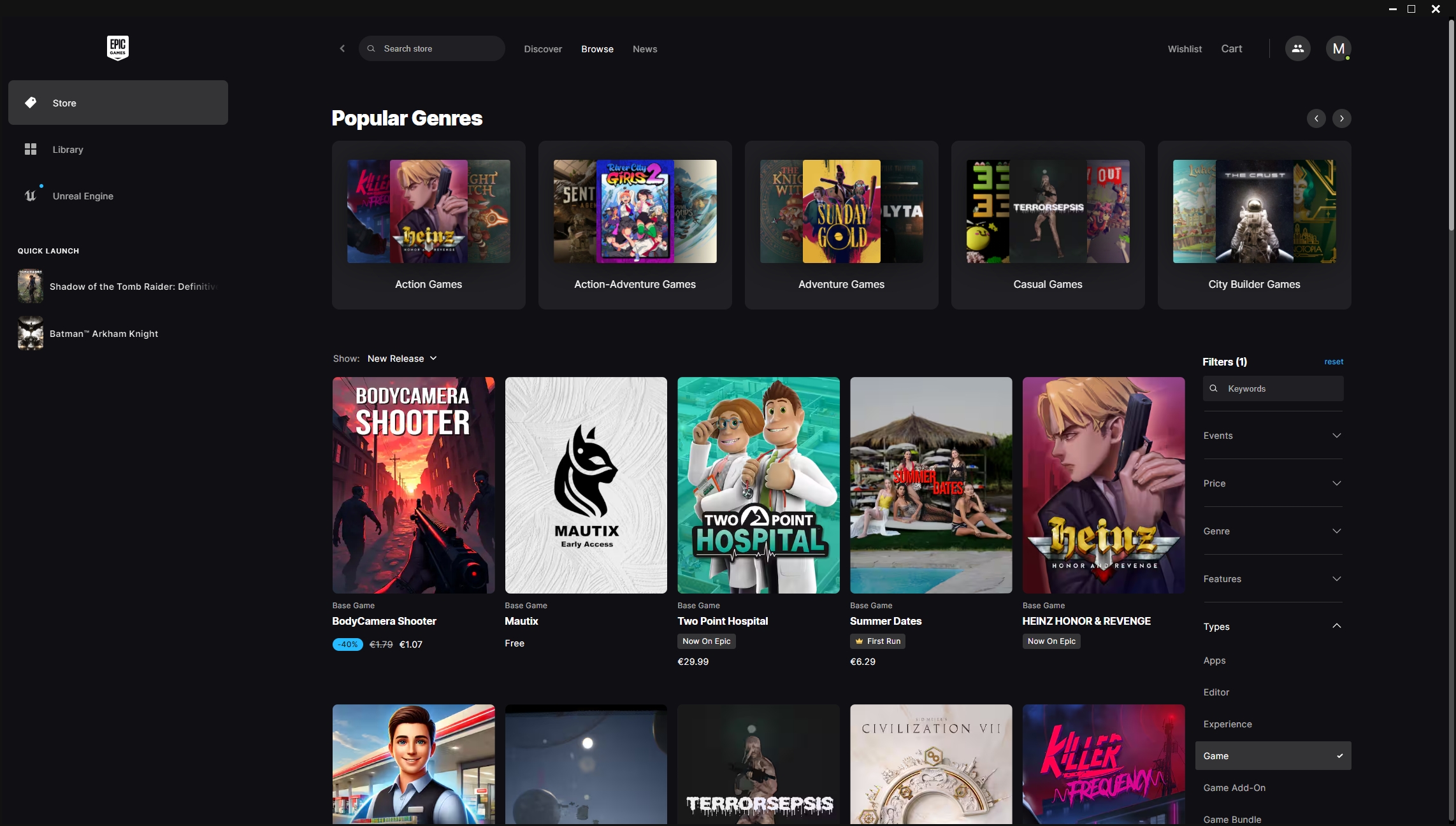
The Epic Games Store, on the other hand, is hands down more user-friendly, with a more modern and minimal design that’s more consistent across its pages and sections. Unfortunately, though, it misses some crucial features and options that Steam users get, many of which I still don’t understand why Epic Games hasn’t integrated.
For example, when trying to decide if you should buy or game or not, unlike Steam, which includes thousands of user reviews, Epic Games only features reviews from some popular and well-known gaming sites. It’s crazy that the game launcher hasn’t introduced user reviews, which I find very useful and important for all customers. It also misses on other features that Steam integrated into its platform, including a recording tool that helps you quickly record your games and share the videos with your friends.
Steam also has some other great features that players can use, including remotely playing or downloading their favorite games, broadcasting/streaming their gameplay to Twitch and YouTube, more parenting controls, and even the Steam Workshop, which is basically a platform for players to create, share, and download mods and custom content for supported games.
Steam is arguably the clear winner here, with many more features and a robust game launcher that has nothing to envy.
Steam has SteamOS and Epic Games has the Unreal Engine
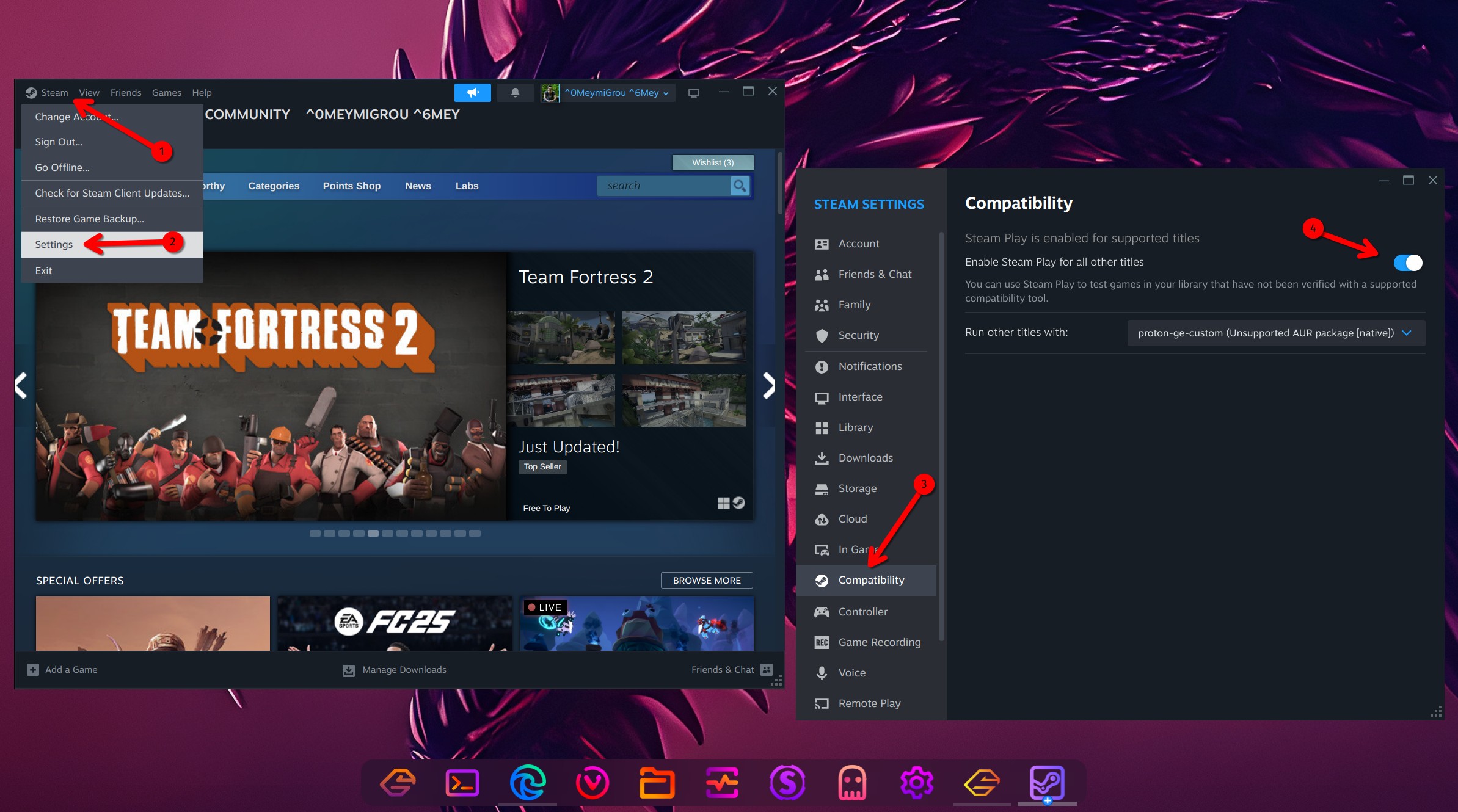
Both companies have already contributed a lot to the gaming community. Valve has built its own operating system called SteamOS, and it comes with Proton, a technology that makes thousands of games that were designed for Microsoft’s Windows available for Linux gamers.
Their operating system is based on Arch Linux, and they’ve made sure that their marketplace is also available on any distro – which makes it the ultimate cross-platform game launcher. Steam also includes the system requirements needed for each game that is available for Linux, something that we don’t see on the Epic Games Store, which only includes macOS as an alternative to Windows.
Related Content:
For Linux users, Steam is arguably their best salvation at finding and installing their favorite titles with ease, while Epic Games hasn’t even built a native Linux app. Thankfully, Linux users can easily install third-party game launchers such as the Legendary or Heroic Games Launcher – both of which have been designed to make Epic Games’s titles available on any Linux distribution.

But Epic Games has developed the Unreal Engine, which is the most popular and powerful 3D creation tool in the world, used by almost all known game developers, companies, and even individuals. You can use the tool to design almost anything that you can imagine, from objects and characters to the most highly detailed environments.
Thanks to the vast community supporting and building third-party extensions and tools for Unreal Engine, and with the company giving the tool completely free for everyone who wants to use it, it’s arguably the project of the century. Although Unreal Engine is not the only 3D creation tool and is not perfect by any means, it has played a crucial role in the technology that helps us develop modern games.
Steam vs. Epic Games Store: Which is the best for new players?
In short, Steam is the king when it comes to the number of games that you can get, while Epic Games has the best weekly offers. Steam is the ultimate solution for cross-platform gamers, while Epic Games is mostly great for Windows and macOS users. Steam is more robust, with a recording tool to help you save your best gameplay sessions, while Epic Games is minimal, modern, and with fewer options.
If you want to support your favorite developers, Epic Games keeps a lower fee, but getting a license from a third-party website and then adding it to Steam may actually result in higher commissions for the folks behind the game. For game developers and people interested in designing their own games, Epic Games’s Unreal Engine is by far one of the most popular choices overall.
But should you choose just one? Nah…
Both marketplaces have their own exclusives and unique offers and help to avoid having a Google-like monopoly in the gaming landscape. Players who use both of these places to get their games instead of just one tend to have more titles in their libraries and a better understanding of how each one works.
Choosing just one platform may be a huge mistake, except maybe for non-gamers who only occasionally play a free title just for fun. Go with both, and take advantage of their offerings and limited-time free games.

